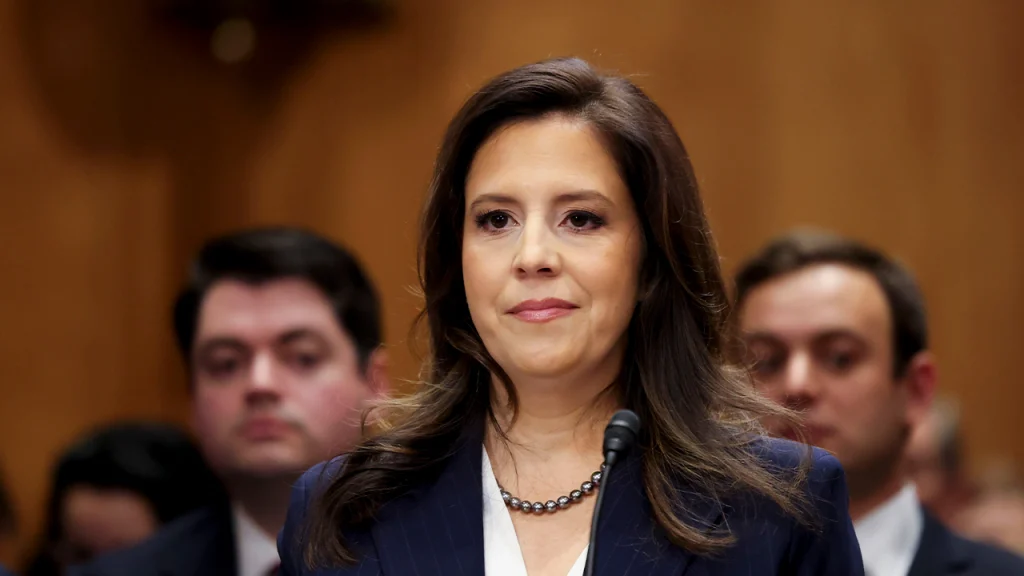Stefanik’s Journey: From Capitol Hill to NY Governor’s Race Amid Fight Against Antisemitism
In an emotional ceremony at Manhattan’s Museum of Modern Art, Representative Elise Stefanik accepted the World Jewish Congress’ prestigious Theodor Herzl Award, their highest honor, just days after announcing her candidacy for New York governor. Speaking before 400 distinguished guests, Stefanik received the award from Ronald Lauder, businessman and former U.S. Ambassador to Austria under President Reagan. The award, established in 2012, recognizes individuals who embody Herzl’s vision for a secure Jewish community. In her acceptance speech, Stefanik expressed profound gratitude to Lauder for his “steadfast leadership” and “extraordinary commitment to the cause of Jewish unity and security,” acknowledging how the World Jewish Congress has continued Herzl’s vision of creating not just a Jewish homeland, but fostering “a Jewish people strong, self-reliant, and respected among the nations.” Her humility was evident as she recognized the organization’s decades-long role as both the diplomatic voice and moral conscience of Jewish people worldwide.
Stefanik’s fight against antisemitism has become a defining element of her congressional career, particularly following her viral questioning of university presidents during a 2023 congressional hearing. She recounted her now-famous exchange with the presidents of Harvard, MIT, and the University of Pennsylvania, where she asked a seemingly straightforward question: “Does calling for the genocide of Jews violate your university’s code of conduct?” Their hesitant responses—that “it depends on the context”—shocked the nation and catalyzed what Stefanik described as “a global reckoning.” She emphasized the moral clarity needed in confronting antisemitism, stating unequivocally that condemning calls for genocide “does NOT depend on the context.” This moment marked a turning point in accountability for higher education institutions regarding their handling of antisemitism, with ripple effects still being felt across campuses nationwide.
The timing of this honor holds particular significance as Stefanik transitions from her role as House Republican Conference Chair to gubernatorial candidate in New York, a state she describes as “the epicenter of the battle for the very Western values that have shaped America.” With New York being home to the largest Jewish population outside Israel, Stefanik expressed deep concern about the alarming rise in antisemitic incidents across the state, which reached “an all-time high last year, the highest count in the nation.” Her commitment to addressing this crisis forms a central pillar of her gubernatorial campaign, as she pledged to continue calling out “Antisemitism. Bigotry. Jew-hatred. Anti-Americanism.” Throughout her acceptance speech, Stefanik drew parallels between Herzl’s vision and the current challenges facing Jewish communities, stating that “Herzl’s story is not ancient history” but rather a continuing source of inspiration for building a more secure future.
Support for Stefanik’s gubernatorial aspirations has quickly emerged from prominent figures in the Jewish community, including billionaire philanthropist Miriam Adelson, who publicly endorsed her candidacy during the Zionist Organization of America’s Justice Louis D. Brandeis Award Dinner. At this separate event, Stefanik received the Mortimer Zuckerman Maccabee Warrior Award for her antisemitism work, further cementing her credentials on this issue. Adelson praised Stefanik as “a great leader” who has consistently defended “the Jewish people, Israel and the Free World.” This endorsement carries particular weight given the Adelson family’s significant influence in both Republican politics and pro-Israel advocacy circles. Miriam Adelson specifically referenced her late husband Sheldon Adelson’s emphasis on moral conviction, suggesting she sees these qualities reflected in Stefanik’s approach to public service.
Stefanik’s political evolution has been remarkable, transforming from an early critic of Donald Trump during his first presidential run to becoming one of his most loyal defenders in Congress. This transition reflects the broader realignment within the Republican Party over recent years, with Stefanik now positioning herself as a standard-bearer for the party’s current direction. Her gubernatorial campaign, officially launched on Friday, presents a direct challenge to Democratic Governor Kathy Hochul in what promises to be a highly competitive 2026 race. As chairwoman of the House Republican Leadership, Stefanik brings significant political experience and name recognition to the contest, though she will face the challenge of competing in a traditionally Democratic-leaning state. Her campaign appears poised to focus on issues of public safety, economic opportunity, and standing against extremism—themes she touched on during her acceptance speech.
The confluence of Stefanik’s gubernatorial announcement and receipt of these prestigious Jewish community awards highlights how central the fight against antisemitism has become to her political identity. By framing her campaign within the context of defending “Western values” and combating bigotry, Stefanik is attempting to position herself as a moral leader during divisive times. Her invocation of historical events like Kristallnacht alongside modern challenges facing Jewish communities creates a narrative of continuity in the struggle against hatred. “This moral fight is particularly important in New York,” she emphasized, connecting her political ambitions directly to the welfare of the state’s significant Jewish population. Whether this positioning will resonate with the broader New York electorate remains to be seen, but Stefanik’s reception at these recent events suggests she has built substantial credibility with Jewish leaders and organizations as she embarks on her campaign to become New York’s next governor.


